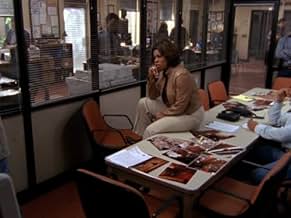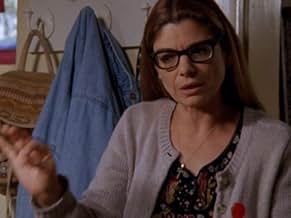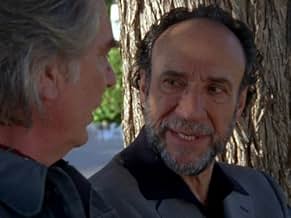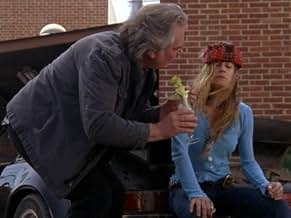An angel offers a jaded Oklahoma City police detective the chance to redeem her life.An angel offers a jaded Oklahoma City police detective the chance to redeem her life.An angel offers a jaded Oklahoma City police detective the chance to redeem her life.
- Nominated for 3 Primetime Emmys
- 5 wins & 18 nominations total
Browse episodes
Storyline
Did you know
- TriviaThe lasts names of many of the main characters are also names of Oklahoma towns: Ada, Dewey, Stillwater, Norman, Perry, Yukon, and Hanadarko.
- GoofsMany scenes throughout the series show palm trees in the background, which are non-existent in Oklahoma due to the cold winters.
- ConnectionsFeatured in The 60th Primetime Emmy Awards (2008)
- SoundtracksSaving Grace
(Main Title Theme)
Written by Erik Schrody (as Everlast)
Performed by Erik Schrody (as Everlast)
Courtesy of E.T.C.F. Music Publishing, Inc.
Featured review
This was a great show with wonderful actors, mainly good story lines and smart dialogs. It has a lot of cool lines especially for main actress Holly Hunter, who is really adorable as the center of all things in the show. After some time a solo that big would become a bit dull, but luckily there are a lot of great supporting actors, first of all Leon Rippy, who gives some Kind of Oklahoma-Style Angel, a really nice invention with all his southern accent and cowboy behavior.
As everyone knows, the story is about detective Grace Hanadarko, a drinking, smoking, swearing, scrappy fan-girl of all kinds of intercourse in her late 40's, and how she moves away from and back to God, as a result of some mystic incidents, one of them is the appearance of Angel Earl after she killed a pedestrian with her car, driving drunken.
Following the main character's lifestyle, the show is often rude, with graphic sexuality, sometimes offensive against the church or Christian belief. That's why I liked it, plus a good pinch of black humor and serenity, mixed with a sometimes heartbreaking drama.
But don't misunderstand me, the religious side turns out not to be that serene as expected through Grace's statements or actions. On the contrary, this is partially a complete fairy tale about Heaven, God, and angels, and how to bring a black sheep back to the community of believers. There may be a few lines scratching the Christian belief systems, but after all, God sits in limbo, does some incomprehensible things if he wants, but is like the Bible tells us. And he sends Angels like Earl, to rescue people worth being rescued (others may not be worthy enough, so they aren't rescued).
How Grace's universe works, especially the God aspect, is taught us in every episode a little more, like a puzzle, which we have to solve together with Grace. Luckily she is a Police Detective and her best friend Rhetta is a forensic scientist believing in God, Mysteries and Angels. Rhetta collects all the puzzle parts, leading Grace and us to come close to the possible solution(s).
So the message is that there's someone out there who cares for your undying soul, even if you are rude, alcoholic, reckless, sex-addicted and whatsoever. You only have to have a dark secret in your childhood, that made you the way you are, apart from the rest you are basically good-hearted. And if you deny to come back to the herd of god's sheep, he will continue to try.
What the show makes really interesting is, that you can see that everyone has a great love for Grace's so-called flaws or defects, although they are shown as things God (or morality) do not like. When she sleeps with her recently married workmate, which is a sin, when she drinks and laughs and is rude, when she curses or when she does idiotic and immature things out of her provocativeness, she is always sympathetic, even in denying god with the f-word. There is also (mostly) no Devil present, who tries to seduce her. All bad things - in the way bad things are meant by a Christian society - come directly from Grace herself. She is ill-bred and bad socialized, a rebel. The seduction from the Devil comes - if ever - in other ways and may not even intended by the authors.
Between those extremities - on one side the naive sight of morality and on the other side the advanced picture of a modern, strong (and weak at once) woman who does not want to addict herself to questionable common moral values - the show tackles with an astonishing amount of certitude. The degree of moral and religious philosophy is kept very low in words and actions, instead the audience is let (mostly) to decide what's wrong or good with Grace.
It is a real pity that the show was canceled, the reasons are not so clear, it seems not to be a matter of quotes. The last few episodes feel a bit hasty and are not quite in line with the original ideas. Nevertheless I think 'Saving Grace' is something like a milestone in portrayal of a modern woman.
As everyone knows, the story is about detective Grace Hanadarko, a drinking, smoking, swearing, scrappy fan-girl of all kinds of intercourse in her late 40's, and how she moves away from and back to God, as a result of some mystic incidents, one of them is the appearance of Angel Earl after she killed a pedestrian with her car, driving drunken.
Following the main character's lifestyle, the show is often rude, with graphic sexuality, sometimes offensive against the church or Christian belief. That's why I liked it, plus a good pinch of black humor and serenity, mixed with a sometimes heartbreaking drama.
But don't misunderstand me, the religious side turns out not to be that serene as expected through Grace's statements or actions. On the contrary, this is partially a complete fairy tale about Heaven, God, and angels, and how to bring a black sheep back to the community of believers. There may be a few lines scratching the Christian belief systems, but after all, God sits in limbo, does some incomprehensible things if he wants, but is like the Bible tells us. And he sends Angels like Earl, to rescue people worth being rescued (others may not be worthy enough, so they aren't rescued).
How Grace's universe works, especially the God aspect, is taught us in every episode a little more, like a puzzle, which we have to solve together with Grace. Luckily she is a Police Detective and her best friend Rhetta is a forensic scientist believing in God, Mysteries and Angels. Rhetta collects all the puzzle parts, leading Grace and us to come close to the possible solution(s).
So the message is that there's someone out there who cares for your undying soul, even if you are rude, alcoholic, reckless, sex-addicted and whatsoever. You only have to have a dark secret in your childhood, that made you the way you are, apart from the rest you are basically good-hearted. And if you deny to come back to the herd of god's sheep, he will continue to try.
What the show makes really interesting is, that you can see that everyone has a great love for Grace's so-called flaws or defects, although they are shown as things God (or morality) do not like. When she sleeps with her recently married workmate, which is a sin, when she drinks and laughs and is rude, when she curses or when she does idiotic and immature things out of her provocativeness, she is always sympathetic, even in denying god with the f-word. There is also (mostly) no Devil present, who tries to seduce her. All bad things - in the way bad things are meant by a Christian society - come directly from Grace herself. She is ill-bred and bad socialized, a rebel. The seduction from the Devil comes - if ever - in other ways and may not even intended by the authors.
Between those extremities - on one side the naive sight of morality and on the other side the advanced picture of a modern, strong (and weak at once) woman who does not want to addict herself to questionable common moral values - the show tackles with an astonishing amount of certitude. The degree of moral and religious philosophy is kept very low in words and actions, instead the audience is let (mostly) to decide what's wrong or good with Grace.
It is a real pity that the show was canceled, the reasons are not so clear, it seems not to be a matter of quotes. The last few episodes feel a bit hasty and are not quite in line with the original ideas. Nevertheless I think 'Saving Grace' is something like a milestone in portrayal of a modern woman.
- How many seasons does Saving Grace have?Powered by Alexa
Details
Contribute to this page
Suggest an edit or add missing content










































